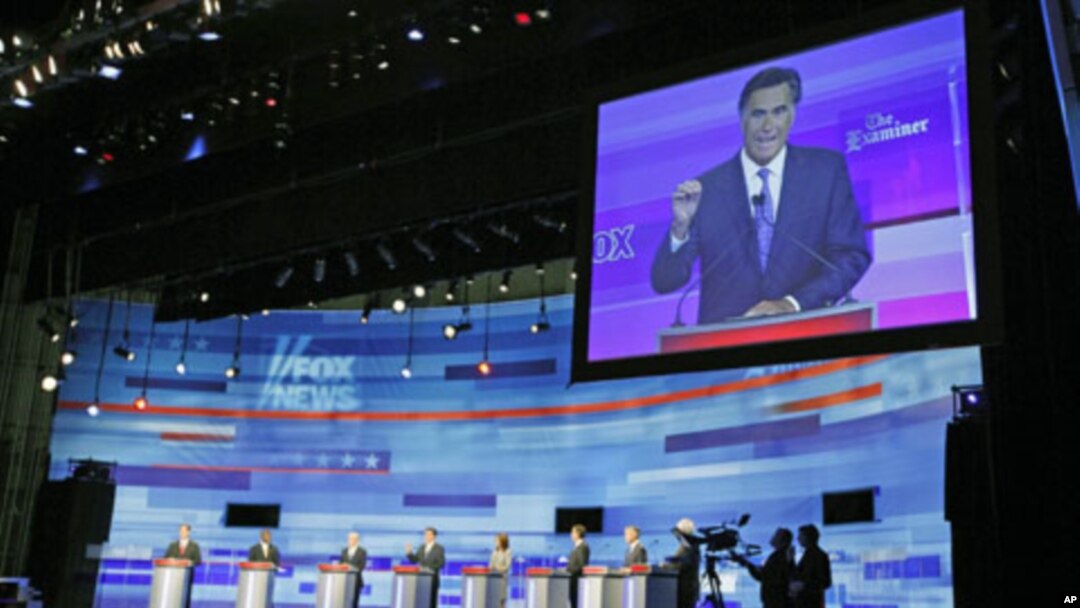In U.S. presidential politics, the economy and jobs are expected to dominate next year’s election. But many of the Republicans running for their party’s presidential nomination have some strong views on foreign policy and they are making them known as the campaign rolls on.
The latest entrant into the presidential race is Texas Governor Rick Perry, who has served as governor for more than 10 years. But like most of his rivals for the Republican Party nomination, he has little experience in foreign policy.
During a recent visit to the early presidential contest state of Iowa, Perry left little doubt that he has strong views on U.S. relations with Israel and on national security in general.
“We are going to stand with our friends. Israel is not going to have to worry if I am the president of the United States where we are going to be. We are going to be standing with our friends. And if you are our enemy we are not going to just give you some lip service. If you try to hurt the United States, we will come defeat you,” said Perry.
U.S. troops in Afghanistan
The war in Afghanistan also is drawing attention from the candidates, especially during debates.
Republicans have long supported the U.S. military presence in Afghanistan, but even the Republican frontrunner, former Massachusetts governor Mitt Romney, took note of the public’s war fatigue during a recent debate.
“Sometime in the next two years we are going to draw down our troop strength and reach a point where the Afghan military is able to preserve the sovereignty of their own nation from the tyranny of the Taliban. That has to happen,” said Romney.
Focus on Iran
Iran is a favorite target of several of the Republican contenders, who say it remains the number-one threat to Israel and a major security concern for the United States.
The only one who strays away from this line of attack is Texas Congressman Ron Paul. Paul says he would not impose sanctions on Iran even if it developed nuclear weapons, and he is also the only contender in the crowded Republican field who opposes the wars in Afghanistan and Iraq.
“I say a policy of peace is free trade, stay out of their internal business, do not get involved in these wars, and just bring our troops home!” said Paul.
Paul’s comments drew a strong response from fellow contender Rick Santorum, a former senator from Pennsylvania.
“Anyone that suggests that Iran is not a threat to this country or is not a threat to stability in the Middle East is obviously not seeing the world very clearly. He sees it exactly the way that Barack Obama sees it,” said Santorum.
China relations
Former Utah governor Jon Huntsman is one of the few Republican candidates with extensive foreign policy experience. Earlier this year, Huntsman completed a tour as President Obama’s ambassador to China and he is fluent in Mandarin. He previously served as U.S. ambassador to Singapore under President George H. W. Bush in 1992.
Huntsman noted his experience during a recent debate.
“As far as you can see into the 21st century, we are going to have to deal with the Chinese. We better get it right. I understand this relationship. I have been at it for 30 years. I think it would be a great thing to have a president of the United States who knew something about China,” said Huntsman.
Political analysts say that while the campaign likely will be dominated by the domestic economy, events overseas, particularly unexpected ones, could have an impact on next year’s election.
Stuart Rothenberg said on VOA’s Encounter program, “It is all about results. What is going to happen on the ground between now and the next election in Afghanistan and in Iraq? Are we going to have stable environments? Are we going to have talk about terrorists being allowed to gather and train?”
Public-opinion polls show Americans generally have more confidence in President Obama’s ability to handle foreign policy issues than the domestic economy, another reason why the Republican candidates are likely to focus their lines of attack on jobs and other domestic issues.
Republican Presidential Contenders Speak Out on Israel, Iran, China

US Republican presidential candidate Mitt Romney is seen on the screen during the presidential candidate debate in Ames, Iowa, August 12, 2011 (file photo)

